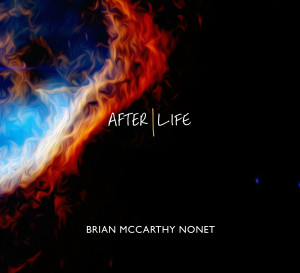 Saxophonist, composer, and bandleader Brian McCarthy doesn’t think small. In 2017 the critically acclaimed concept piece he recorded with his nonet, The Better Angels of Our Nature, delved into the Civil War era and its music through reimagined folk songs and original compositions. As a follow-up he shoots for the stars. Literally. His brilliant cycle After|Life, recorded with the same nine players, musically explores the origins and evolution of our Solar System and life on Earth.
Saxophonist, composer, and bandleader Brian McCarthy doesn’t think small. In 2017 the critically acclaimed concept piece he recorded with his nonet, The Better Angels of Our Nature, delved into the Civil War era and its music through reimagined folk songs and original compositions. As a follow-up he shoots for the stars. Literally. His brilliant cycle After|Life, recorded with the same nine players, musically explores the origins and evolution of our Solar System and life on Earth.
Inspired by astronomer Carl Sagan’s statement, “We are made of star stuff,” McCarthy pondered the cyclical nature of the universe, the possibility that it will eventually collapse and then explode into a reborn reality – and the distinct possibility that this has already happened, perhaps many times. “The life that we’re living is basically a form of whatever came before us,” McCarthy says. “In that sense, we exist in the after life. I’m fascinated by the fact that all the molecules that make up our bodies, our atmosphere, the planet that we live on and all the planetary bodies around us were once a part of the same giant structure. We are all inevitably connected, even at a molecular level, no matter how different we might think we are.”
These are heady scientific and philosophical – even spiritual – concepts. But the music on After|Life, while heavenly to listen to, is distinctly down to earth. This is for the most part tuneful, melodic jazz by a crew that’s in synch. Many of the players have been collaborating with him since his days at William Paterson University or in Clark Terry’s band. Joining BMack, who plays alto and soprano saxes, are trumpeter Bill Mobley, saxophonists Daniel Ian Smith, Andrew Gutauskas and Stantawn Kendrick, trombonist Cameron McManus, bassist Matt Aronoff, pianist Justin Kauflin and drummer Jared Schonig.
The brief (3:08) “Nebula,” an impressionistic piece of long droning deep chords, segues into the rollicking, swinging “The Beginning.” In 15 minutes it moves from a musical impression of controlled chaos – multilayered counterpoint from all the horns – through gradual movement toward cohesion. The piece is also a great introduction to the voices of this nonet, which McCarthy employs to expertly paint a wide ranging and colorful sonic canvas. Here’s an excerpt.
“Flux” begins with a majestic horn choir and proceeds with much dignity in a portrayal of the ebb and flow of energy on a cosmic scale. At 12 minutes, “Flux” gives McCarthy plenty of time to develop the theme compositionally and the players plenty of room for development against the ensemble’s dense background. The next piece, “Kepler’s Law,” is fairly short but clever and engaging, especially if you’ve just been reading about the Scientific Revolution. The original Kepler’s Law, as fully developed by Isaac Newton, had to do with the effects of gravity on the deceptively complex orbits of Earth and the other planets. I take this piece, which revolves around a lengthy solo intro by bassist Aronoff, as a meditation on the dances of the planets around the sun.
The album itself revolves around the three part suite “After|Life.” The three movements fill nearly 30 minutes of lovely ensemble jazz, beginning with a simple swinging melody and building to the frenetic pace of modern life. Movement I is cool and swinging, II a rich and stately ballad, and III a more complex funky stew.
Finally there’s the “bonus track” of “Lucy,” dedicated to the fossilized hominid from our ancestral home in Africa. The piano-centric tune is built on a three-note motif that NASA sent out in a call to artists to create music inspired by its 2021 mission to study the formation of the solar system. Am I crazy to hear a slight echo of another “Lucy” here, perhaps a bit of inspiration from the great Vince Guaraldi?
I listened to After|Life much more than I needed to in order to write a review. This music has such grace and dignity on top of its sense of swing and harmony and just plain fun, it’s become one of my favorite albums of 2023 so far.
